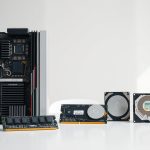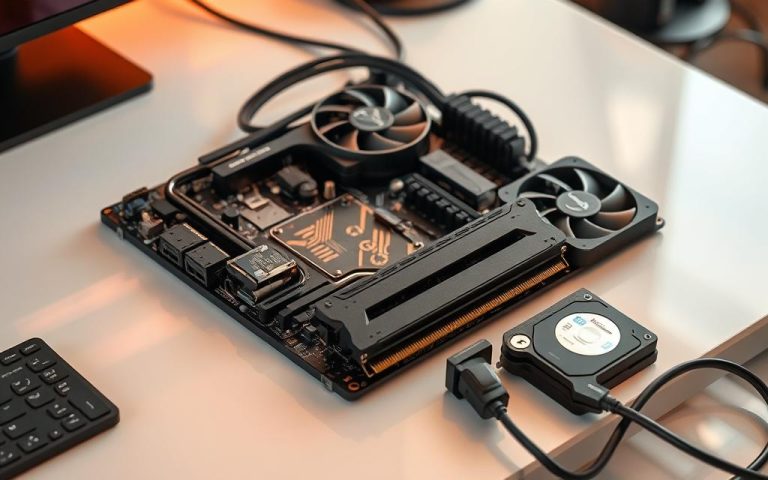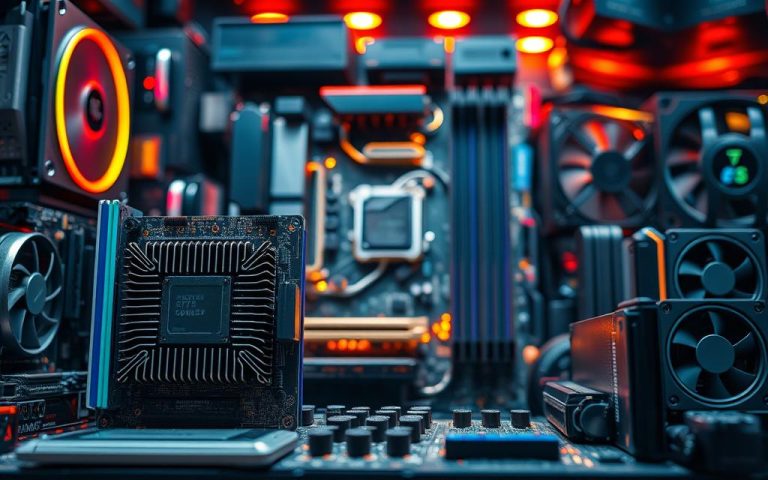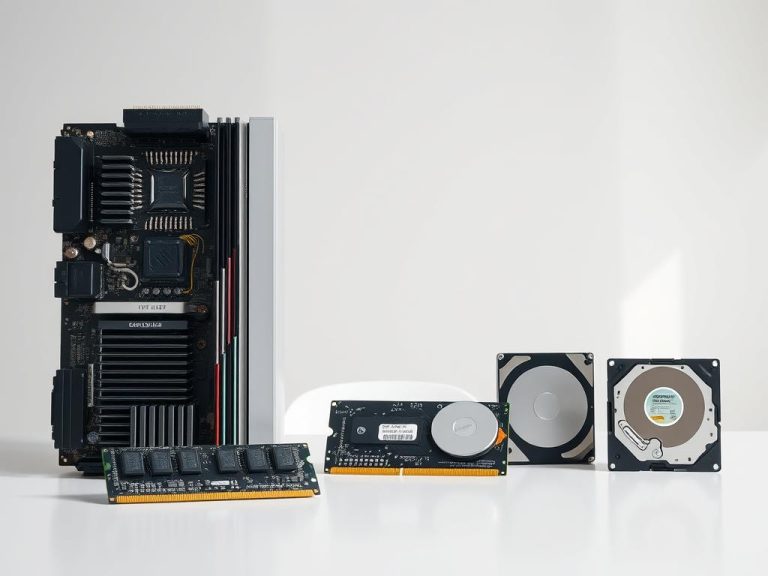Essential Skills and Education to Become a Computer Hardware Engineer
Computer hardware engineers design and develop advanced technological systems. This profession demands technical expertise and creative problem-solving skills. It’s a career that drives innovation across many industries.
The journey starts with a solid educational foundation. Most employers prefer candidates with a bachelor’s degree in computer or electrical engineering. Students spend about four years honing skills for this competitive field.
Academic preparation involves mastering complex technical concepts. Students learn about intricate computer systems and develop analytical thinking skills. Top programmes often require a minimum 3.0 grade point average.
Internships are crucial for aspiring computer hardware engineers. These experiences offer insights into real-world engineering challenges. They also help students build professional networks in the tech sector.
Professional certifications can boost a computer hardware engineer’s marketability. The Institute of Electrical and Electronics Engineers (IEEE) offers respected credentials. These validate technical expertise and commitment to professional growth.
Additional certifications like CompTIA A+ can set candidates apart. These qualifications demonstrate specialised knowledge and skills. They’re valuable assets in a competitive job market.
Overview of Computer Hardware Engineering Career
Computer hardware engineering is a dynamic field at the forefront of technological advancement. These skilled professionals design, develop, and test computer systems and components. They power our digital world with their expertise and innovation.
Computer hardware engineers shape technological progress across multiple industries. Their tasks drive innovation and development in various sectors. They play a crucial role in advancing computer technology.
Core Professional Responsibilities
- Designing computer systems and computer circuit boards
- Developing computer hardware prototypes
- Testing and analysing computer hardware performance
- Modifying existing hardware to improve efficiency
- Recommending advanced hardware configurations
Industry Impact and Growth
The computer hardware engineering industry shows steady growth. The U.S. Bureau of Labor Statistics projects a 5% job growth from 2021 to 2031. This growth indicates ongoing demand for technological innovation across various sectors.
| Career Metric | Statistics |
|---|---|
| Median Annual Salary | £132,360 |
| Top 10% Earnings | Over £208,200 |
| Projected Job Growth | 5% (2021-2031) |
Workplace Settings
Computer hardware engineers work in diverse environments. These include research laboratories, manufacturing facilities, technology corporations, and innovative start-ups. Their work requires creativity, technical expertise, and continuous learning.
- Research and development departments
- Technology manufacturing companies
- Government agencies
- Telecommunications firms
- Computer systems design organisations
Professionals in this field must stay adaptable. They need to update their skills regularly. This helps them keep up with rapid technological changes.
What Do You Need to Become a Computer Hardware Engineer
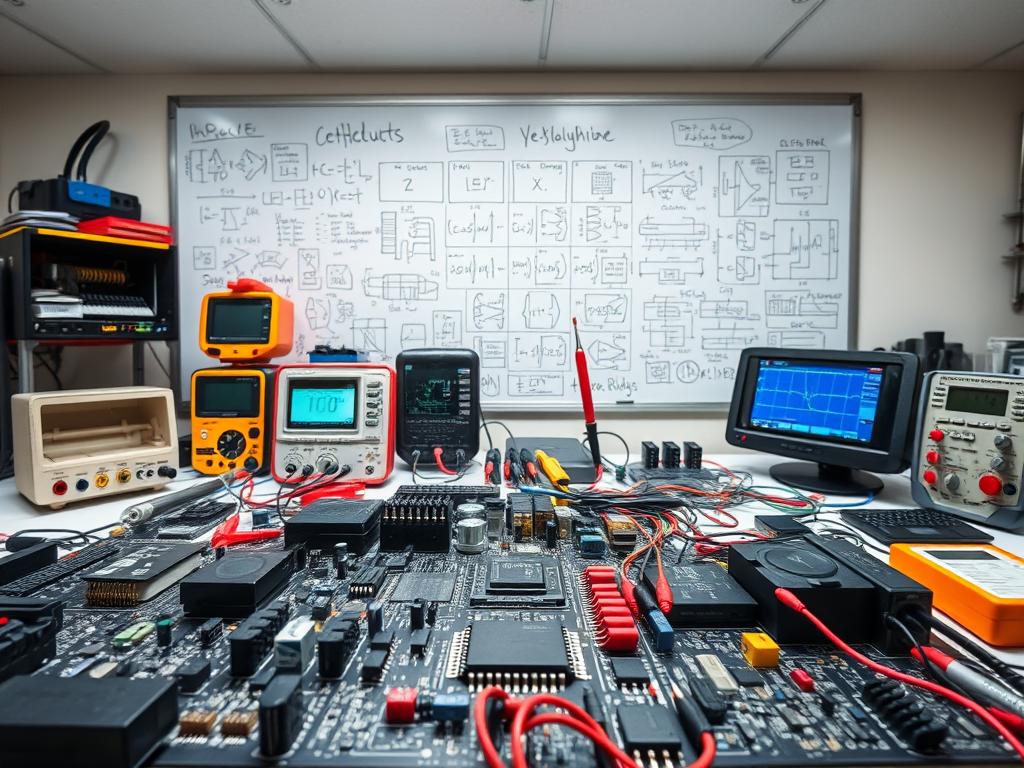
A career in computer hardware engineering demands a strategic educational path. It starts with a solid foundation in engineering disciplines. Specific qualifications are crucial for success in this field.
Educational credentials are vital for a thriving hardware engineering career. Most employers look for candidates with particular academic backgrounds.
- Bachelor’s degree in computer engineering
- Electrical engineering degree
- Related technical fields such as computer science
The engineering qualifications landscape shows intriguing trends. About 48% of hardware engineering jobs require a bachelor’s degree. Meanwhile, 34% call for a master’s degree.
This educational progression reflects the role’s technical complexity. It underscores the importance of advanced learning in this field.
Aspiring hardware engineers should also focus on building practical skills. This can be achieved through various means:
- Internship programmes
- Professional certifications
- Hands-on technical training
Professional groups like the Society of Women Engineers offer valuable networking chances. With over 40,000 members, these organisations support budding talent in engineering.
Technical expertise and continuous learning are paramount in computer hardware engineering.
Entry-level hardware engineers can expect starting salaries around £78,440. There’s significant potential for growth as expertise develops. The field offers exciting prospects for those committed to technical education.
Essential Technical Skills for Hardware Engineers
Computer hardware engineering requires a robust set of technical skills. Successful hardware engineers need programming proficiency, design expertise, and analytical capabilities.
The technical skills for hardware engineers evolve rapidly. Modern engineers must be versatile and adaptable in their professional toolkit.
Programming and Coding Proficiency
Programming skills are crucial for hardware engineers. Key languages include Verilog, C++, Python, and VHDL.
- Verilog for digital circuit design
- C++ for system-level programming
- Python for automation and testing
- VHDL for hardware description
Computer-Aided Design (CAD) Expertise
CAD expertise is vital in modern hardware engineering. Approximately 70% of hardware engineering jobs require proficiency in CAD software.
Engineers must create detailed schematics, design prototypes, and perform complex simulations.
Circuit Design and Analysis Skills
Advanced circuit design skills set exceptional hardware engineers apart. Circuit analysis involves understanding electrical system architectures and performing signal integrity checks.
- Understanding electrical system architectures
- Performing comprehensive signal integrity checks
- Developing robust hardware solutions
- Implementing efficient troubleshooting methodologies
Hardware engineers who update their skills and embrace new technologies position themselves for success. This dynamic field rewards those who stay current with industry trends.
Professional Development and Career Advancement
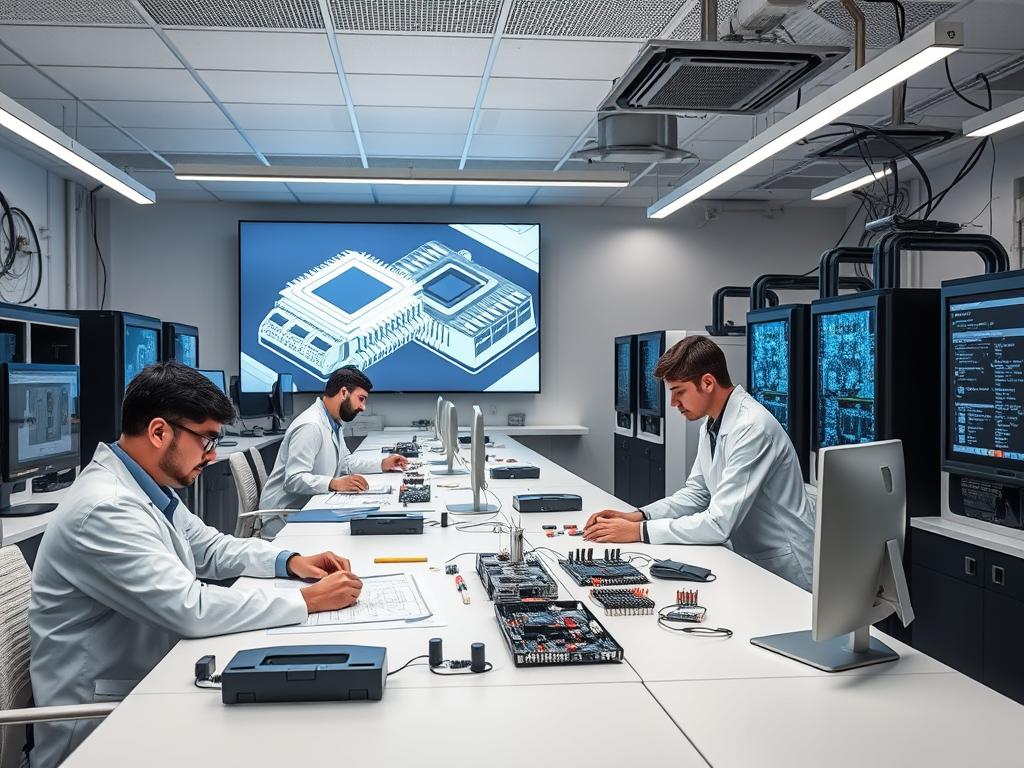
Hardware engineering careers need a smart approach to professional growth. Engineers must keep their skills fresh in this fast-changing tech world.
Top hardware engineers know the value of ongoing learning. They update their skills to stay ahead in the field.
Key ways to move up include:
- Pursuing advanced certifications from recognised bodies like IEEE and CompTIA
- Specialising in emerging technology domains such as embedded systems and AI hardware
- Developing expertise in cutting-edge programming languages
- Networking within professional organisations
45% of computer hardware engineers take online courses and get certifications. 80% of employers prefer candidates with hands-on experience in hardware design and programming.
“Continuous learning is the minimum requirement for success in hardware engineering” – Tech Industry Expert
Career paths often lead from entry-level to senior roles like project manager. Hard work and smart skill-building can boost career prospects greatly.
Joining groups like IEEE can increase networking chances by 40%. This offers vital links for career growth.
About 25% of pros in this field have advanced degrees. These can speed up career progress in hardware engineering.
Salary Expectations and Job Market Outlook
Hardware engineering offers exciting opportunities with competitive pay. The median annual wage is £138,080, varying across industries. Job prospects are promising, with 7% growth projected from 2023 to 2033.
Experience greatly influences compensation in this field. Entry-level engineers start around £92,532. Salaries can reach £159,968 for those with 15+ years of expertise.
Education also affects earning potential. Master’s degree holders average £112,013, while bachelor’s graduates earn about £102,574.
Location plays a significant role in salary ranges. California leads with mean wages of £173,270, followed by Massachusetts at £158,070. The San Jose-Sunnyvale-Santa Clara area offers the highest pay, up to £191,300.
The job market outlook is bright, especially in tech-driven regions. Emerging sectors like AI and quantum computing show promise.
Top-paying industries reveal interesting trends. Financial services offer the highest wages at £218,098. Healthcare follows closely at £225,721.
The job market provides moderate employment opportunities. Skilled hardware engineers can expect a stable and potentially lucrative career path.
FAQ
What exactly does a computer hardware engineer do?
Computer hardware engineers design, develop, and test computer systems and components. They create innovative solutions for processors, circuit boards, memory devices, and networking equipment. Their work drives advancements in computing across various industries.
What educational qualifications are required to become a computer hardware engineer?
A bachelor’s degree in computer engineering, electrical engineering, or a related field is essential. Many professionals pursue advanced degrees or specialised certifications. These enhance career prospects and technical expertise.
Which programming languages are most important for hardware engineers?
Key programming languages include C++, Verilog, and VHDL. These are crucial for designing and testing complex hardware systems. They’re also vital for developing efficient computer components.
What are the typical work environments for computer hardware engineers?
Hardware engineers work in diverse settings like research labs and manufacturing facilities. They’re also found in technology companies, aerospace firms, and telecommunications organisations. Their work involves both team projects and independent technical development.
How competitive are salaries in computer hardware engineering?
The field offers competitive compensation, varying by experience, location, and industry. Entry-level engineers can expect substantial starting salaries. There’s significant growth potential in specialised areas like AI hardware and quantum computing.
What certifications can enhance a hardware engineer’s career?
Professional certifications from IEEE, CompTIA, and Cisco can boost career prospects. These credentials demonstrate advanced technical skills. They also show commitment to professional development.
What are the future job prospects for computer hardware engineers?
The job market for hardware engineers is extremely promising. Growth is projected in emerging fields like IoT and AI hardware. Continuous learning and adapting to new technologies are key to long-term success.
What technical skills are most crucial in hardware engineering?
Critical skills include circuit design and Computer-Aided Design (CAD) proficiency. Programming expertise and understanding of complex system architectures are also important. Staying updated with rapidly evolving technological trends is crucial.
Can hardware engineers specialise in specific areas?
Yes, hardware engineers can specialise in diverse fields. These include embedded systems, mobile device design, and automotive electronics. Medical device technology, aerospace computing, and AI hardware components are also options.
What are the career advancement opportunities in this field?
Hardware engineers can progress to senior engineering roles and project management positions. They can also move into technical leadership and research specialisations. Entrepreneurial opportunities in technology innovation are available too.





